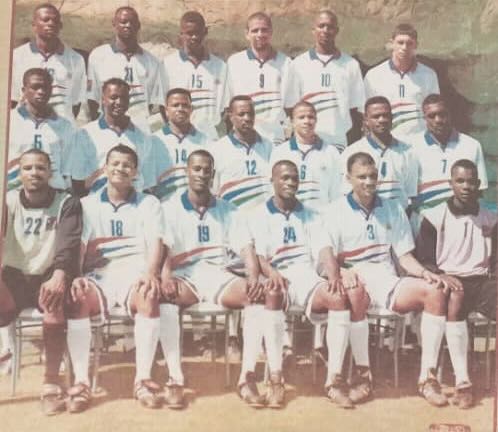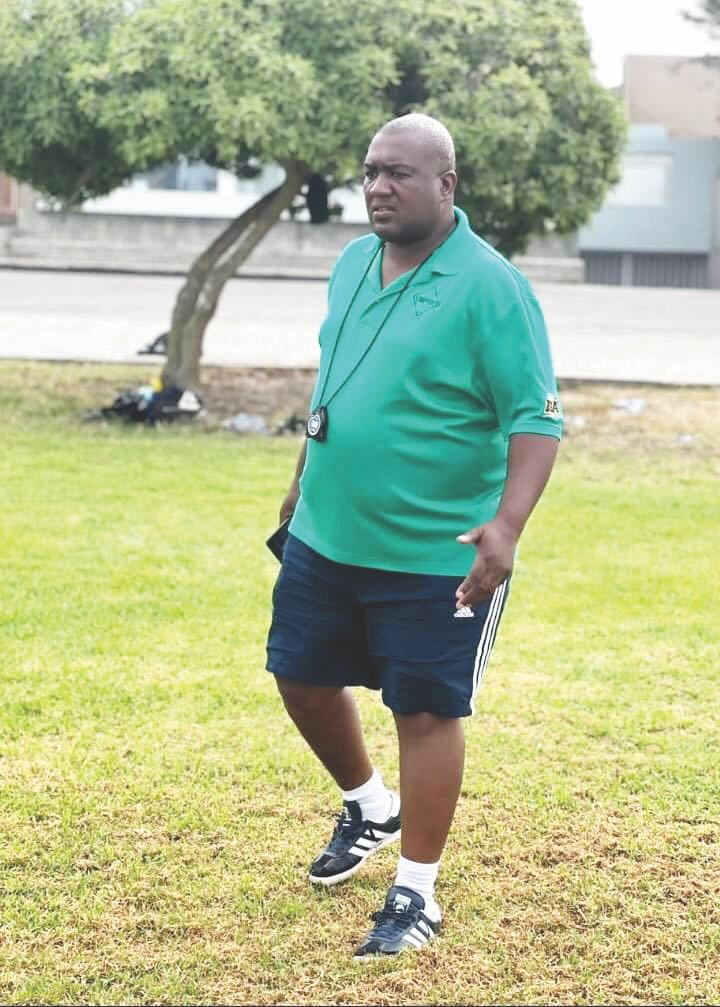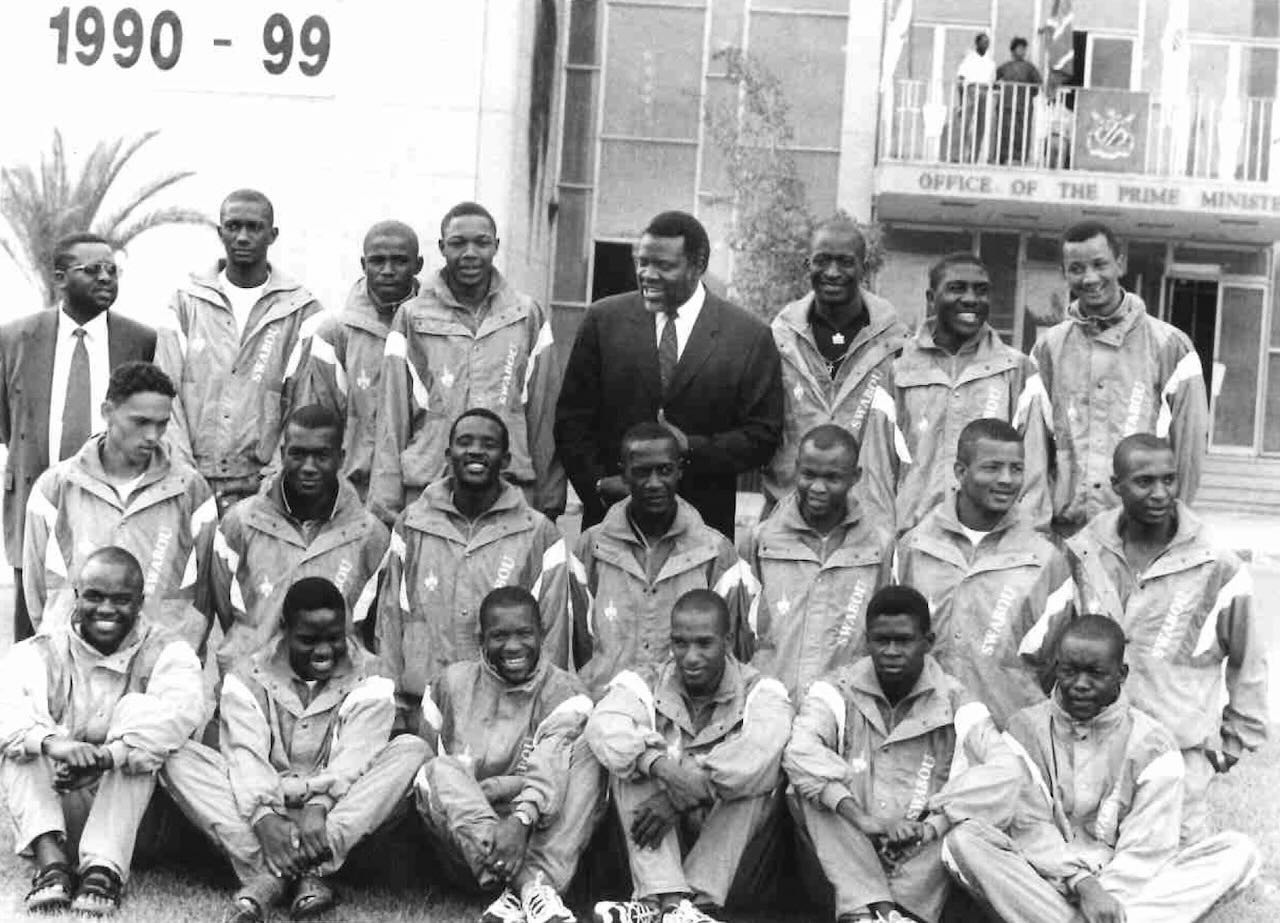Former Blue Waters and Life Fighters midfield ace Heinrich ‘Barnes’ Angula rates among the best distributors of the ball, something he learned from former Black Africa wonderboy Lucky ‘Thindwa’ Bostander.
The Otjiwarongo native says he grew up admiring Bostander.
“I wanted to play like him. He was such a great player, very calm, a brilliant shooter and passer, and he had great ball control. Bostander was any coach’s dream midfielder. Despite my admiration for him, I tried to make an impact of my own. I was good at winning the ball back. I distributed with both feet and probably my best attribute was my shooting. I was an accurate shooter from range and I had a great fighting spirit,” he says.
The strongly built retired star started playing football in the dusty streets of Orwetoveni at the age of eight, from where he graduated to the former Herero (now Orwetoveni) Primary School’s under-10 team, and later under-14 team.
He singles out his school teachers who coached the under-10 and under-14 team – Erastus Kgobetsi and Benes Haimbodi – as the two people who played a big part in his football career by shaping his game from a very young age.
“By the time I went to Paresis Secondary School, I was an automatic choice for the first team, all thanks to my two primary school coaches. I joined Silent Killers, a team co-founded by my father, in the First Division,” Angula notes.
“I also played briefly for Citizens before Life Fighters, who were campaigning in the Premier League, came knocking at our front door. It was initially a very daunting task joining Fighters because of the fierce tribal rivalries that existed in our township.”
However, things turned for the better after his father finally gave in, after Angula’s likeable school teacher and football coach, Herman Katjiuanjo, convinced him to allow his son to join Life Fighters, coached by Katjiuanjo at that time.
Angula, who was named footballer of the year throughout his years at Paresis, went on to make a name for himself in the midfield of the maroon and white outfit, where he was comfortable to be deployed as a lock, while also shining as a libero.
“The endurance I gained as a 400m runner at school came in very handy. I had an energetic presence in the Life Fighters engine room. I also gained invaluable experience captaining the under-15; 17; 20 and 23 national teams,” Angula says.
“What also made me a standout player was my ability to read the game. I was very good at anticipation, which enabled me to cut out the attacks of the opposition team through the middle. I can say without any hesitation that I was a very technical player.”
Apart from receiving multiple individual player of the year awards at school, the retired footballer also clinched the coveted national schools under-20 Coca-Cola Cup in 1995, before they lost in the final to Suiderlig Secondary School in 1996.

The final victory was capped with two brilliant goals. One, a booming shot from the centre of the pitch, and the other a thunderous bullet from the edge of the penalty to reconfirm his reputation as a master of his trademark long range goals.
“Although I was a regular for the junior national teams, which I even captained from the under-15s up to the under-23s, I represented my country in numerous regional, as well as continental competitions, while leading the team on the pitch,” Angula says.
“I also received many call-ups to the senior national team from different coaches but it is very weird that I only got to play once, as a second half substitute for George Hummel in a World Cup qualifier against Egypt, which we only lost by an odd goal in Cairo.”
Although narrowly going down 1-0 to the Pharaohs in a partisan Cairo Stadium in 1999, the match was a dream come true for him to eventually play for the Brave Warriors, and it was a long time coming.
Nevertheless, the former midfielder, who received his first call-up under coaches Rusten Mogane and Peter Ueberjahn in 1997 for the Cosafa Cup in Lesotho, admits that other more experienced players could play in his position.
“Coaches like (Peter) Ueberjahn, (Rusten) Mogane, the late Ted Dumitru, ‘Professor’ Ngubane and (Herman) Katjiuongua showed their faith in my abilities by always calling me up to the senior team, but to be in the first 11 wasn’t easy,” he says.
“I mean, with the talent displayed by the likes of Mohammed Ouseb, Ricardo Mannetti, Bobby Samaria, Lucky Kakuva and Paultjie Bostander, who were far more experienced than myself, it was always going to be an uphill task to start ahead of them.”
Angula says his biggest regret as a footballer happened after he broke his leg and could not be part of the history-making Brave Warriors Class of 98 that represented Namibia in her first Africa Cup of Nations finals in Burkina Faso.
He is the very proud father of two minor children, and while Angula is not married yet, he promises that it is something that is definitely in the pipeline.

Equipped with a level three plumbing diploma that he obtained through the Namibian Institute of Mining and Technology (Nimt), he worked for TransNamib for 10 years, starting at Walvis Bay, as well as a further seven years as a train assistant at Otjiwarongo.
“I underwent my plumbing training through Nimt at Arandis and I have to thank my former team, Life Fighters, for seeing me through my training. They didn’t even make a fuss about me joining Blue Waters during my training,” says Angula.
“I had enough of plumbing after 10 years, and I returned to Otjiwarongo to work as a train assistant. But I quit my job almost three years ago to concentrate on farming. I’m a part-time goat farmer in the Okakarara district, as well as at Outapi,” he says.
He also manages a transport business that transports people between Otjiwarongo and Windhoek on a daily basis.
Angula urges young players “to believe in God and to show respect to others”.
“Work hard and be dedicated and, most importantly, have a vision of what you want to achieve in life. People say practice makes perfect, but I learned from coach (Peter) Ueberjahn that the right training makes perfect,” he adds.
Stay informed with The Namibian – your source for credible journalism. Get in-depth reporting and opinions for
only N$85 a month. Invest in journalism, invest in democracy –
Subscribe Now!






